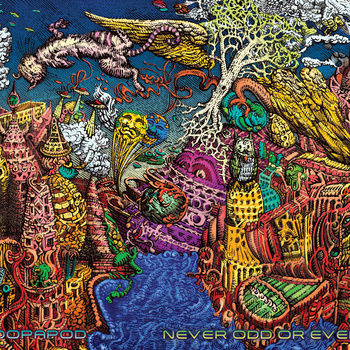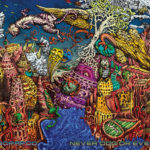
The thing that might strike a listener first when tossing on Never Odd or Even is guitarist Rob Compa’s vocals. They’re almost couched more in Neil Young’s canon than any of their electronic contemporaries. That says a lot and reveals the central motif here: Dopapod is playing odd and exciting games with their influences and even their own sounds from previous albums.
This is a wide open album, one almost totally built for vast expanses of American freeway and accompanying pine trees, pastures, cornfields, etc.
The lead single off this one, “Picture in Picture,” is driven by Chuck Jones’ hefty bass lines. Eli Winderman’s keys dance atop a steady rhythm, and, as we return to each verse, drummer Scotty Zwang guides us with precision beats. It’s an esoteric jam wrapped in the festive atmosphere of a late-night party.
From there, the album swerves around bends in the road and clips exotic tree limbs en route to the finish line. “FABA,” a microcosm of the album writ large, spawns a quirky, springy melody. “Sleeping Giant” evokes its namesake and calls to mind “I Am the Walrus”-ish organ work — all while building up an ascent toward climactic prog-rock chorus. “Hey Zeus! (¿Que Tal?)” flirts with a sludgy take on “Sunshine of Your Love” before dovetailing into a rockabilly motif — leaving plenty of open spaces in its riffs for onstage jamming — and then hitting the Cream classic once more on the way out.
There’s a lot going on here, and the classic rock ‘n’ roll lineage is clear throughout.
The dichotomy between lead and rhythm is well crafted, with Winderman’s assorted keyboard sounds and effects taking a likely MVP role. And while we’re talking lead here, the listener gets enticing peeks at Compa’s ability to shred on six strings, but his prowess is used more as a sonic accent to the album’s overall climate and mood (which works divinely to the band’s credit).
(Real quick: Take a look at the cover art and consider that this is a visual album, almost more than anything.)
The closing duo of “Psycho Nature” and “Upside of Down” juxtaposes aggression against bliss. The keys and lead guitar passages in the latter rank among the album’s best musical moments, leading the listener back to the open road and whatever destiny awaits further on down the line.



No Comments comments associated with this post